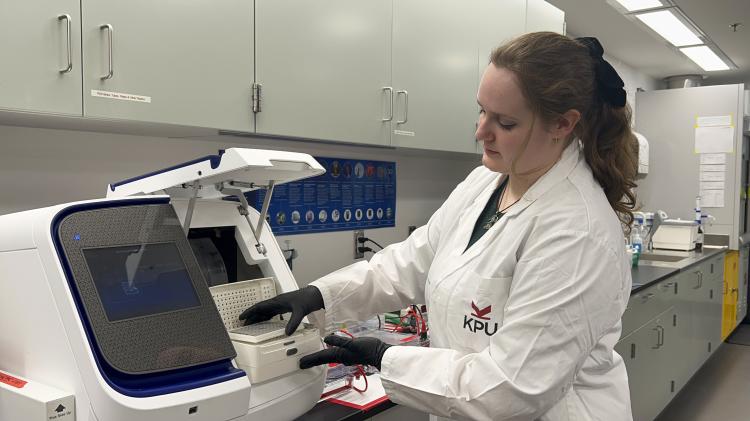Researchers at Kwantlen Polytechnic University (KPU) have developed a new test that will help protect salmon populations in B.C.

KPU student Tamryn Kennedy at the Applied Genomics Centre.
Developed by Dr. Paul Adams and his team at KPU's Applied Genomics Centre, this test is designed to detect a bacteria called Aeromonas salmonicida.
"Aeromonas salmonicida is quite common in both wild and farmed salmon," says Adams. "It affects their health and their sustainability over time, and ultimately availability for the food sector."
To ensure the accuracy of the test, the team spent time sequencing the entire genome of the bacteria as well as those of closely related species.
"There are around 4.5 million letters in this bacteria's genome, so we sequenced all of them to make sure this test is extremely specific to this bacteria.
"The test is based on quantitative polymerase chain reaction (qPCR), which is a very accurate molecular test, similar to the type of test used to detect COVID-19 in humans."
Several student research assistants were involved in developing the tool, including Tamryn Kennedy, a fourth-year Bachelor of Science in Biology honours student at KPU.
"I think it's very unique to KPU to have such a hands-on learning environment and to have such a great opportunity to come in and use high-tech tools," she says.
"It's also an opportunity to contribute to work that can make a difference," she says. "It's really rewarding to realize that it's going to be going out into the public and it's not just something that happens in a lab."
The test was developed in partnership with the B.C. Ministry of Agriculture and Food and will eventually be available through their diagnostic lab at the Animal Health Centre in Abbotsford. The study was supported by $278,000 of funding from the BC Salmon Restoration and Innovation Fund.
Founded in 2019, the Applied Genomics Centre at KPU is a research lab focused on developing molecular genetic solutions and using other genomic tools to provide research and innovation support to BC's agricultural sectors. Students have the opportunity to gain critical research and development skills while engaged in projects that have a direct impact on their community.













